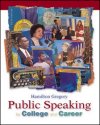While informative and persuasive speeches are the most frequent types, there
are occasions when speech must serve other purposes. When you need to entertain
an audience, as in an
after-dinner talk, your remarks should be light and diverting; any elements
of information or persuasion should be gracefully woven into the fabric
of entertainment. One device for an entertaining speech is to string together
anecdotes, examples, or quotations on a single theme. Extended narratives or
descriptions also can be entertaining. Using humor in a speech is an effective way to create a bond of warmth
and friendliness with an audience. Be cautious in telling jokes because they
can be risky, and listeners may have heard the joke already. A safer type is
low-key humor, such as a mildly amusing story, quotation, or observation. Whatever
humor you use should relate to the topic and not be offensive to any person
in the audience. When you are asked to introduce a speaker, convey enthusiasm for the speaker
and the topic, and give whatever background information is necessary to enhance
the speaker's credibility. When you make a speech of presentation, focus your remarks on the award
and the recipient. When you are called upon to "say a few words" in
acceptance of an award or promotion, thank the people who gave you the honor
and acknowledge the help of those who made your success possible. When you give a speech of tribute, praise the person, group, institution,
or event being honored, avoiding any negativity. When you speak to inspire an audience, devote yourself to stirring emotions,
using a dynamic delivery to convey your zest and enthusiasm. | 


 2002 McGraw-Hill Higher Education
2002 McGraw-Hill Higher Education